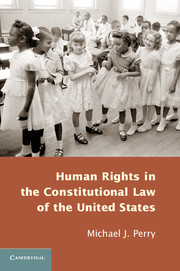Introduction: Human Rights in the Constitutional Law of the United States
Published online by Cambridge University Press: 05 July 2013
Summary
In the period since the end of the Second World War, there has emerged what never before existed: a truly global morality – specifically, a global political morality. That morality, which I call “the morality of human rights,” consists both of a fundamental imperative, which serves as the normative ground of human rights, and of various human rights – of various rights, that is, recognized by the great majority of the countries of the world as human rights.
Some of the morality of human rights is entrenched – more precisely, some of the rights internationally recognized as human rights are entrenched – in the constitutional law of the United States. Because, as I explain in Chapter 2, a human right is, whatever else it is, a moral right, I refer to the set of internationally recognized human rights that are entrenched in the constitutional law of the United States as “the constitutional morality of the United States.”
A basic understanding of the morality of human rights greatly enhances our understanding of the constitutional morality of the United States. My aim in Part I of this book is to provide that basic understanding. I begin, in Chapter 1, by sketching the internationalization of human rights: the growing international recognition and protection, in the period since the end of the Second World War, of certain rights as human rights. Then, in Chapter 2, I explain what it means to say, in the context of the internationalization of human rights, that a right is a “human right.” Finally, in Chapter 3, I discuss the normative ground of human rights: the fundamental imperative, articulated in the very first article of the foundational human rights document of our time – the Universal Declaration of Human Rights (1948) – that governments “act towards all human beings in a spirit of brotherhood.”
- Type
- Chapter
- Information
- Publisher: Cambridge University PressPrint publication year: 2013



